Catch up on our latest news and events
Check out the latest Cities Research Institute news, members activites and achievements, and look back on past news and events.
Recent Institute and Members Activities
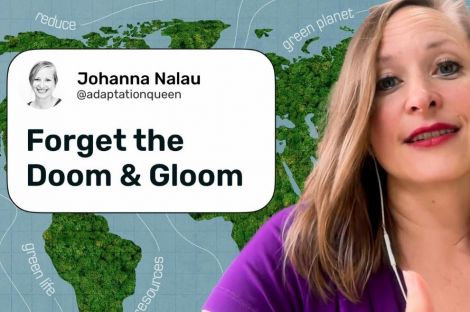
Unpacking climate adaptation
September | Online
Where does climate mitigation end and adaptation start, howcan we implement these strategies today, and what is the role of imagination infacing climate impacts? The Creators for Climate sat down with CRI’s A/Prof Johanna Nalau, an adaptation scientist and contributor to the International Panel for Climate Change (IPCC) reports, to learn more about climate adaptation.
As she explained, it’s not just about reducing emissions any more...the effects of climate change are here. Adaptation is our chance to prepare for what's coming and rethink our relationship with nature. Johanna puts it simply:
Adaptation is about making better decisions today, to keep us safer in the future.

Recent Grant Wins
Quantum 2032 Challenge: $492,900 - CRI and Data61, CSIRO, have secured $492,900 in funding for the project Quantum Optimisation of Transport and Logistics for Brisbane 2032. This research aims to explore quantum optimisation of pedestrian movements around stadiums and introduce transport planning agencies to quantum technologies.
NEMA Disaster Ready Fund: $412,464 - Project How are we reducing heat-health risk in Queensland and how will we know? has been awarded $412,464 in funding through the National Emergency Management Agency (NEMA) Disaster Ready Fund (DRF). This project will assess which Heat Risk Resilience Actions (HRRAs) have been implemented across Queensland’s Local Government Areas (LGAs); develop a comprehensive HRRA model to guide LGAs in managing heat-health risks; and, create a framework to quantify and report heat-health impacts, empowering Queensland to deliver real-time risk communications and strengthen community resilience.
DECRA 2025: $452,019 - Congratulations to CRI Adjunct Research Fellow Dr Christopher Ambrey on securing $452,019 in total funding for project, On the Hardship that is Homelessness, one of the 200 early career researchers named in the latest round of Australian Research Council (ARC) Discovery Early Career Researcher Award (DECRAs). Homelessness is a global human rights issue that persists even in nations with the resources to address it. Chris’s study aims to generate new insights by investigating: how individuals fall into and climb out of homelessness; the impact of homelessness on wellbeing; and how these impacts change over time as individuals remain homeless. Leveraging underutilised longitudinal data and advanced nonlinear panel data techniques, the research will fill crucial knowledge gaps and inform real-world service practices and policy changes.

A Grand Tour: Decarbonising Olympic transport
July - October | Paris, France and London, United Kingdom
PhD research isn’t just at a desk. It can take candidates far and wide. We asked PhD candidate Anais Fabre to share her recent Olympic travels:
During the Paris 2024 Olympics and Paralympics, I conducted field work exploring whether the Games can serve as a catalyst for decarbonising host cities' transport systems. My PhD research, supervised by A/Prof Michael Howes, Dr Ayşın Dedekorkut-Howes, and Dr Millicent Kennelly, involves a three-way case study of the London 2012, Paris 2024, and Brisbane 2032 Olympic Games.
In Paris, I used participant observation to study access to Olympic sites, low-emission transport options, and how the city’s mobility system handles increased patronage during the Games. I also conducted interviews with key stakeholders, and audited how the mobility system works with the extra patronage during the Games and the role of transport decarbonisation projects. I then travelled to London in September to gather data on the 2012 Games’ legacy.
A highlight was presenting my research at the 11th International Sport Business Symposium in Paris on August 8th. My talk, Delivering Climate-Positive Olympic Games: How Can Urban Transport Play Its Part?, highlighted the economic, policy and social factors influencing transport emissions in host cities. Griffith University was an academic partner of the event, and it was a great opportunity to connect with colleagues from around the world.

Flowing together: HDR on research-industry colabs
July, Hamilton Island
PhD candidate Sam Guy recently co-presented a paper at the Australian Water Association North Queensland Conference on Hamilton Island. The presentation, Navigating Water Resilience: Partnerships for Demand Management (nominated for Best Paper) supported the conference theme “Unearthing the hidden gems of the water industry in the north: showcasing excellence and sharing opportunities for progress”.
Sam drew from her industry experience in water conservationto explore how research-industry partnerships can drive real progress in water efficiency. She showcased preliminary literature review findings from her PhD research, to highlight the necessity of moving beyond token stakeholder / community engagement towards true collaboration, especially in the context of managing water demand in remote Australian communities. As an Australian Water Association Young Water Professional Sub-Committee Member, Sam enjoyed the opportunity of representing fellow Young water professionals among the list of speakers for the conference.

Wonder of Science: HDRs visit central Qld
August | Central Queensland
Over the past few months, PhD candidate Cassidy Winter has been actively contributing to the Wonder of Science initiative, a program based at UQ and supported by Griffith University, aimed at promoting a STEM culture in Queensland schools. The program, recognised by the Falling Walls Engage and Eureka Prize awards, sends PhD candidates and postdocs into classrooms to inspire the next generation of scientists.
In August, Cassidy and her Wonder of Science colleague Heshani (QUT) travelled through Central Queensland, engaging students from Emerald, Gladstone, and Rockhampton. They explored the scientific method through hands-on projects like building seismographs and experimenting with optimal conditions for seed growth—all while embedding STEM concepts into the curriculum.
Reflecting on her experience, Cassidy shared, “It’s been a real adventure, and a great way to get out there, practice public speaking, and meet some of the scientists of tomorrow.”
Cassidy’s dedication has been recently recognised by Griffith Sciences. She was Highly Commended in the 2024 Student Impact awards.
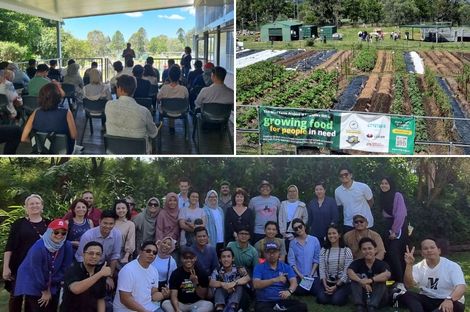
International Visitors for Logan Mini-Farm
April, Logan
Indonesian delegates recently visited The Mini Farm Project at Loganlea State High School to learn about EBE and CRI efforts in urban food planning led by Dr Kim Reis. This event was organised by the Australia Awards in Indonesia short course on Building Modern Cities, led by Dr Ayşın Dedekorkut-Howes, with Dr Tony Matthews.
The farm showcases two key initiatives - providing emergency food relief to charitable organisations in Logan to relieve hunger; and upskilling youth with essential food production skills to improve their long-term food resilience. The visit underscored the pressing issue of food insecurity. Foodbank Australia’s Hunger Report 2023 revealed that 3.7 million Aussie households faced disruptions to their eating patterns such as skipping meals, reduced food quality or quantity. This reality surprised the Indonesian delegates, considering Australia’s wealth.
Through the 'shared responsibility' framework of disaster resilience, we aim to expand this model across Queensland to combat food insecurity and build food resilience.
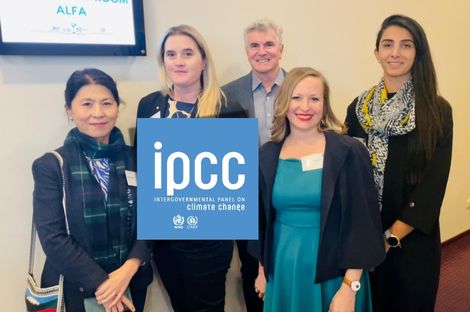
IPCC Scoping Meeting Invitation
Associate Professor Johanna Nalau was one of the 95 scientists chosen from 1300 nominations to attend the meeting to draft the outline of the International Panel on Climate Change Special Report on Climate Change and Cities. This report is expected to be released in early 2027 and will be the only special report produced in the seventh assessment cycle.
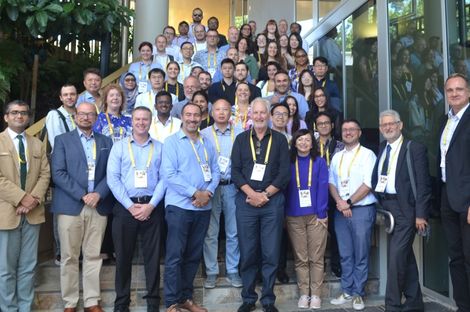
2nd Asia Pacific SDEWES Conference
Professor Rodney Stewart, Professor Cara Beal, Senior Research Fellow Dr Oz Sahin, and PhD candidate Md. Esraz Ul Zannat joined over 200 other scientists, researchers and experts in the field of sustainable development to present their latest research focusing on sustainbable development of energy, water, and environment systems.
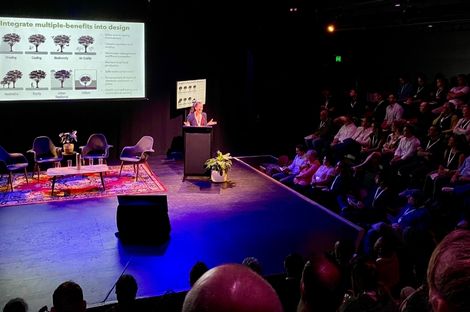
Where the Shade Hits the Pavement Summit
March, Brisbane
Dr. Ruby Michael inspired the audience at Where the Shade hits the Pavement, Green and Blue Urban Planning and Development Summit with her presentation Throwing shade: The opportunity to rebuild flourishing ecosystems in a range of settings. GIRLS and CRI’s supported the City Green as an event partner and with 20 Griffith University future leaders from a range of ecology, engineering and urban planning disciplines attending.
Cities in Griffith News
Train in vain: The end of the car dependent music festival?
26 Aug 2024
Poor ticket sales, high running costs, insurance premiums, changing consumer preferences, and cost...
Have transport woes dampened iconic music festivals’ spirits?
20 Aug 2024
Findings to explore transport issues and alternatives facing stricken Australian music festivals.
Tents, caravans and mobile homes are used after disasters, so why can’t they be...
11 Jun 2024
There is little doubt Australia is in the midst of a profound housing crisis, one that has been...
From white elephants to a sustainable legacy
29 Feb 2024
The scrutiny of infrastructure planning for the Brisbane 2032 Olympics is intensifying. In...
News Highlights 2022 - 2023
Professor Paul Burton takes part in a discussion on Tiny Houses becoming permanent dwellings on SBS The Feed. View here. April 2023
In this time of serious affordable housing shortages, Prof Paul Burton and Dr Heather Shearer share their research on Tiny Houses in The Conversation and Paul comments on Mamamia's podcast, The Quicky. March 2023
Dr Tony Matthews revisits an article he wrote with Dr Joanne Dolley on loneliness in Cities. Read here Sights on Cities.
Assoc Prof Cara Beal and Dr Melissa Jackson have been successful winning a $190k grant for Cape and Torres Strait Indigenous communities water conservation project in collaboration with Torres Cape Indigenous Council Alliance Inc. and 15 remote Indigenous community councils. April 2023
Congratulations to Dr Savindi Caldera on winning the 2023 Inspector-General of Emergency Management International Women's Day Award! May 2023
Newsletter Issue 1, April 2022
Newsletter ssue 2, August 2022
ARC Linkage Grant SuccessAssociate Professor Cara Beal (CRI and School PAM); Professor Rodney Stewart (CRI and School Engineereing and Built Environment); Associate Professor Kerry Bodle (Griffith Business School); Professor Brendan Mackey (Climate Action Beacon); Dr Martin Anda (Murdoch University); Mr Damien Postma (West Australian Water Corporation); Mr Mark David (Torres Strait Island Regional Council); Ms Cheryl Bailey (Indigenous Technology), Dr Melissa Jackson (CRI and Climate Action Beacon) will be the lead post doc.
Industry partners: ERGON Energy Corporation Limited; Torres Strait Island Regional Council; Torres Strait Regional Authority; Power and Water Corporation; Department of Environment, Parks and Water Security; Centre for Appropriate Technology Limited; Water Corporation; Indigenous Technology Pty Ltd
Co-designing a resilient water-energy toolbox with Indigenous communities. The aim is to collaboratively create a toolbox of innovative, community-based approaches for water and energy management in remote Australia. This project will combine digital and cultural approaches to create a novel set of tested and evaluated tools for engaging both community and service providers in transforming water and energy use practises in remote Indigenous communities. The key output will be an empirically-tested and user friendly water-energy toolbox tailored to reduce the currently extreme cost of supplying essential services to remote communities, as well as improving public health outcomes. Application of these outputs will significantly reduce demand on local water sources and diesel-generated energy use while creating a skill base for local employment opportunities. September 2022
Prof Matthew Burke has been continuing his long-standing advocacy to end the private Brisbane Airtrain concession. Matthew's position, now supported by Brisbane City Council, key business associations and much of the general public, continues to gather support and media coverage, such as in this Brisbane Times article. Prof Burke notes the Airtrain concession gives the operators exclusive public transport rights into and around the airport, prevents a lot of meaningful planning and system improvement, and has users pay a very steep fee for an average suburban train to the city. The concession times out after Brisbane hosts the Olympics and Paralympics in 2032.
NHRA Wicked Challenge - 2nd PLACE
A team of 6 PhD candidates from Griffith, Jane Toner, Sheridan Keegan, Ahmed Qasim, Lynn Lue-Kopman, Yunjin Wang, Manori Dissanayaka (Griffith University and CRI), and Cris Hernandez-Santin (RMIT) were recently awarded second place in the 2022 NHRA Wicked Challenge.
The proposal titled "Beacons of Hope", is a process to capture and contribute local knowledge and experience of disaster into Disaster Management Planning that is inclusive of the transient population. The Beacon of Hope is an artistic and interactive structure with both beauty and brains – a creative expression of place and a knowledge bank of local information to fill in the gaps for disaster preparedness. In times of disaster, the Beacon brings real time local information to and from the community by facilitating early warning systems, emergency messaging and feedback loop from community sensors. The Beacons of Hope proposal was informed by Regenerative design, Biomimicry, and creative place-making, while responding to the SENDAI framework for disaster risk reduction.
The team had a host of mentors: Dr Kimberley Reis, Professor Anne Roiko, Dr Nancy Spencer, A/Professor Jamie Ranse, Dr Allison Rifai, Dr Savindi Caldera, Adj Professor Iain MacKenzie, Professor Cheryl Desha. Details of the challenge here.
Professor Hong Guan’s co-authored book has won the China New Development Awards, announced on 1 August 2022 at the awards ceremony at Springer Nature’s Beijing office. The shortlisted books showcase the most impactful sustainable development research from China published by Springer Nature in 2021. Lu XZ, Guan H (2021), Earthquake Disaster Simulation of Civil Infrastructures: From Tall Buildings to Urban Areas, Science Press Beijing, Springer, 934p. ISBN: 978-981-15-9531-8 (Print) 978-981-15-9532-5 (eBook). August 2022
Griffith Enlighten - How public art can reinvigorate Australia’s landscape. Dr Tony Matthews and Sophie Gadaloff. August 2022
Building on Griffith's strategic partnership with APAC Network, Dr Tony Matthews is developing a new television series called Visionary Cities. In addition to editorial and production roles, Dr Matthews will host each episode. Weekly episodes are planned, broadcasting via terrestrial, digital and online platforms across the Asia Pacific. July 2022
This year saw 9 entries for the 3MT competition. As usual in our wonderfully diverse Institute, we had a breadth of speakers talking about research ranging from therapeutic hospital gardens to foot bridges, sustainable large stadiums to sustainable food systems. Congratulations go to:
- Madison Bland - Planning for Active Transport: The planning and funding of walking and cycling infrastructure
- Runner-up - Katharina Nieberler-Walker- Therapeutic hospital gardens.
- Highly Commended was Majed Abu Seif's presentation, Trees on Buildings, Investigating opportunities and challenges for implementation. Both Madison and Katharina competed in the Sciences Group finals. July 2022